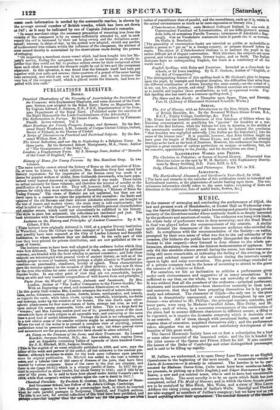MUSIC.
IN the manner of arranging and conducting the performance of Elijah, the last and greatest work of Mendelssohn, at Exeter Hall on Wednesday even- ing, the Sacred Harmonic Society paid a becoming and graceful homage to the memory of the illustrious master whose untimely death is so deeply lamented by the professors and amateurs of music. The orchestra was hung with black; the whole body of performers were in deep mourning; and the Dead March in Saul was played before the commencement of the oratorio. A similar spirit dictated the demeanour of the immense audience who crowded the hall. In compliance with the recommendation of the Society—or rather, prompted by their own sense of what was due to the sad solemnity of the occasion, (for hitherto the public have totally disregarded the wishes of the Society in this respect)—they listened in deep silence to the whole per- formance, abstaining from even the faintest demonstration of applause. Not only did this absolute silence prevail during the music, but there was some- thing still more remarkable, as indicating the feeling of the evening, in the grave and subdued manner of the audience during the intervals usually spent in light and noisy conversation. The great assemblage reminded us of a private company met in the house of mourning to attend to the grave the remains of a relative or friend.
For ourselves, we felt no inclination to criticise a performance given under such circumstances and suggestive of so many associations. It is sufficient to say that, on the whole, it was not unworthy of the occasion. It was evident that all the members of the orchestra—principal performers, choristers, and instrumentalists—bent themselves earnestly to their task; and moreover, that they had been preparing themselves for it by private study and rehearsal. The character of Elijah—the only one in the piece which is dramatically represented, or sustained throughout by one per former—was allotted to Mr. Phillips: the principal soprano, contralto, arid tenor parts, were sung by Madame Caradori Allan, Miss Dolby, and Mr. Lockey; each of whom, as a necessary consequence of the construction of the piece, had to assume different characters in different scenes; a thing to be regretted, as it impairs the dramatic congruity which is desirable even in an oratorio. All of them, though with occasional faults, more of con- ception than of execution, acquitted themselves ably; and the performance taken altogether was an impressive and satisfactory development of the beauties of this great work.
The Sacred Harmonic Society have set on foot a subscription for a bust or some other memorial of the lamented artist; and the list is headed by the joint names of the Queen and Prince Albert for 501. It also contains the names of the Duke of Cambridge and other distinguished personages, and is said to be filling up rapidly.


























 Previous page
Previous page